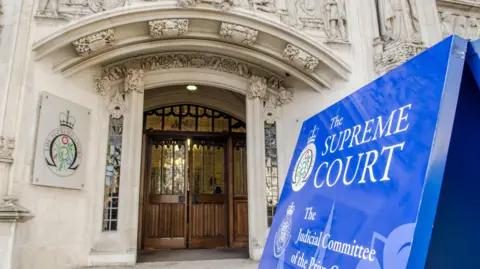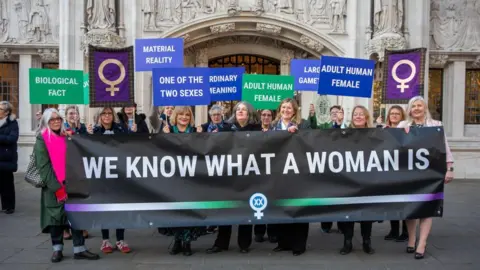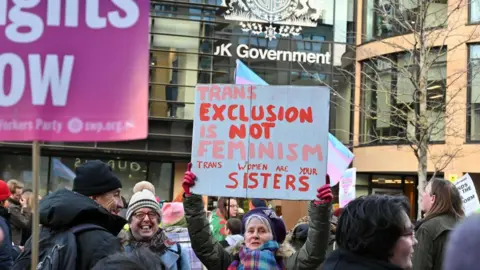Supreme Court to rule on definition of a woman
 Getty Images
Getty ImagesThe Supreme Court is to issue its judgement on how a woman should be defined in law next week.
The case is the culmination of a challenge brought against the Scottish government by a women's group.
But the ruling could have a major bearing how sex-based rights are applied through the Equality Act across Scotland, England and Wales.
For Women Scotland say sex-based protections should only apply to people born female, while the Scottish government says they should also include trans people with a gender recognition certificate.
A ruling is due to be handed down at the court in London on 16 April.
It is expected to set out exactly how the law should treat trans people, and could have implications for the running of single-sex spaces and services.
 Getty Images
Getty ImagesThe long-running legal dispute began with a bill passed at Holyrood in 2018 which aimed to ensure gender balance on public sector boards.
For Women Scotland complained that ministers had included trans people as part of the quotas in that law.
After a series of cases in the Scottish courts, the issue has been sent to the Supreme Court in London for a final ruling.
And it is no longer limited to Scottish law - the judges are deciding on the proper interpretation of the 2010 Equality Act, which applies across Great Britain.
The Act provides protection against discrimination on the basis of various characteristics, including "sex" and "gender reassignment".
The question before the court is what that law means by "sex".
Aidan O'Neill KC, representing For Women Scotland, told the court in November that the "common sense" meaning of the words man and would should be reflected, saying that sex is "an immutable biological state".
But the Scottish government has argued that the 2004 Gender Recognition Act was clear that obtaining a gender recognition certificate amounts to a change of sex "for all purposes".
Its lawyer, Ruth Crawford KC, told judge that "a person who has become the sex of their acquired gender is entitled to the protections of that sex".
Five judges heard two days of argument in November, and they will reconvene to hand down the judgement next Wednesday.
The court's president, Lord Reed, will read a summary of what they have decided at around 09:45.
 Getty Images
Getty ImagesThe Scottish government won the most recent case in the Scottish courts, with judge Lady Haldane ruling in 2022 that the definition of sex was "not limited to biological or birth sex".
For Women Scotland argue that this could have implications for the running of single-sex spaces and services, from hospital wards and prisons to refuges and support groups.
The Equality Act provides an exemption for these groups and services to exclude trans people in limited circumstances, but campaigners say that could be complicated by a ruling which included people with gender recognition certificates under the protected characteristic of sex.
The court heard that it could also affect equal pay claims, maternity policy and sports events, as well as single-sex associations like gay and lesbian clubs.
However trans people have voiced concerns that the case could erode the protections they have against discrimination in their reassigned gender.
And equalities groups have noted that other minority groups are also protected by the Equality Act, with Amnesty International arguing that the case could be the "thin end of the wedge" which could undermine other rights.
Changes to law
The case could also lead to calls for changes to the law itself.
The Equality and Human Rights Commission - the national equalities regulator which is tasked with enforcing the 2010 Act - made an intervention in the case to call for legal reforms.
It said MPs had intended to include those with a gender recognition certificate as having changed their sex when they passed the Equality Act in 2010, but said they may not have appreciated consequences which "jeopardise the rights and interests of women and same-sex attracted people".
Rewriting the law was a Conservative policy during last year's general election campaign.
But Labour's manifesto promised to "simplify and reform" the gender recognition process to remove "indignities".
Meanwhile, the Scottish parliament passed a sweeping gender reform bill in 2022, which would have introduced a simplified system of "self-identification" - but the move was blocked by the UK government, and has since been dropped.
